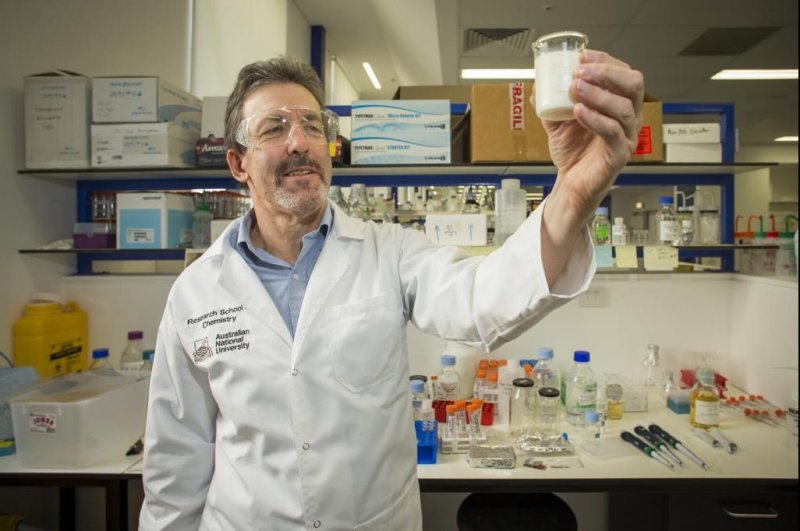Researchers at the Australian National University report that similarities between proteins in UHT milk and proteins in many age-related diseases could lead to a better understand of how the diseases work. Professor John Carver, pictured, of ANU holds a beaker of UHT milk. Photo by Stuart Hay/ANU
April 20 (UPI) -- A new study on ultra-high temperature processing, or UHT, milk is helping researchers better understand certain diseases to lead to better treatment.
UHT, also known as ultra-heat treatment or ultra-pasteurization, is a process that sterilizes milk by heating it to above 275 degrees Fahrenheit for 1 to 2 seconds to kill spores in milk. UHT is also used in fruit juices, cream, soy milk, yogurt, wine, honey and more.
Researchers at Australian National University have discovered that two unrelated proteins aggregate in UHT milk over months to form clusters known as amyloid fibrils that cause milk to transform from a liquid to a gel, and are also found in plaque deposits in patients with Alzheimer's or Parkinson's disease.
Roughly 500 million people worldwide have Azheimer's and Parkinson's disease.
"Parkinson's, dementia and type 2 diabetes are big problems for the aging population in Australia and many other countries around the world," John Carver, professor at the ANU Research School of Chemistry, said in a press release. "Our interest in milk proteins led to a discovery of the reason for this gelling phenomenon occurring in aged UHT milk. The research does not suggest UHT milk can cause these age-related diseases."
Researchers found that the structure of milk proteins changed when heated to around 140 degrees Celsius or 284 degrees Fahrenheit to produce the gelling effect for long-term storage and formed the amyloid fibrils. Normal pasteurized milk did not form amyloid fibrils.
Researchers hope the discovery will help them gain a better understanding of age-related diseases to lead to better treatments for diseases like Alzheimer's and Parkinson's disease.
The study was published in the journal Small.















